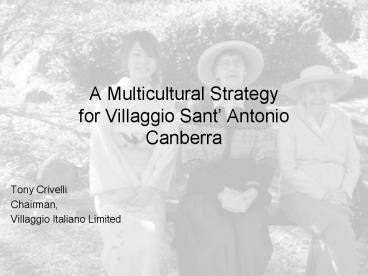A Multicultural Strategy for Villaggio Sant Antonio Canberra - PowerPoint PPT Presentation
1 / 20
Title:
A Multicultural Strategy for Villaggio Sant Antonio Canberra
Description:
Incorporated as Villaggio Italiano in May 1980. Opened in November 1991 with 25 beds ... of social justice, namely: human dignity, the common good, subsidiarity ... – PowerPoint PPT presentation
Number of Views:56
Avg rating:3.0/5.0
Title: A Multicultural Strategy for Villaggio Sant Antonio Canberra
1
A Multicultural Strategy for Villaggio Sant
AntonioCanberra
- Tony Crivelli
- Chairman,
- Villaggio Italiano Limited
2
- Italian foundation of Villaggio
- Current CALD residents profile
- Meeting their needs
- Villaggios multicultural strategy
3
Italian Origins of Villaggio SantAntonio
- An Italian businessman and an Italian priests
vision - Incorporated as Villaggio Italiano in May 1980
- Opened in November 1991 with 25 beds
4
Italian Origins of Villaggio
- one single person should not feel lost an
inspiration for a multicultural vision
5
Current CALD residents origins
- Residents from 19 different culturally and
linguistically diverse groups (April 2007) - Biggest representation
- Australian (40)
- Italian (8)
- English (6)
- Chinese (2), Ukrainian(2), Dutch (2), Latvian
(2), Lithuanian (1), Finnish (1), German (1),
Czechoslovakia (1), Scottish (2),Vietnamese (2),
Philippines (1), Greek (1), Sri Lankan (2),
Maltese (1), Malaysian (1), Turkish (1)
6
CALD residents at Villaggio
- other CALD groups who have resided at Villaggio
- Burmese, Kurdish, Hungarian, Bulgar, Slovenian,
Estonian - Since 2001 the number of CALD groups have varied
between a high of 20 and a low of 15 - CALD residents in this period have varied between
45 and 57 of residents
7
Villaggios Mission
- To operate non-profit, culturally diverse aged
care facilities providing residence for aged
persons with a variety of needs, catering for
residents of every race, colour and creed,
respecting each residents spiritual or religious
beliefs, and aiming to provide such spiritual and
pastoral care as residents generally desire by
the provision of suitable places of worship
8
Villaggios Mission
- noting that Villaggio was established by members
of the Italian community for the benefit of aged
citizens of Italian descent, maintain links with
the Italian community by retaining an Italian
flavour and traditions, while operating within a
culturally diverse environment - to adopt the principles of social justice,
namely human dignity, the common good,
subsidiarity and solidarity and to maintain a
link with the Catholic Church as Villaggios
primary sponsor.
9
CALD special needs
- the many cultural factors that we take into
account (from D Rowland, 2007) - Language and communication
- Religious observance
- Support systems
- Dietary needs and preferences
- Roles within the family
- Traditions and norms
10
Meeting CALD special needs
- Commitment by Board and CEO to a multicultural
environment and care - Adoption of aging in place
- Dedicated Diversional Therapist
- Team of four Activities Staff
- Care staff from NESB backgrounds
- Volunteers
11
Our activities to meet CALD special needs
- Assessment of leisure and lifestyle
- Physical and cognitive
- Social and emotional
- Spiritual and cultural
- Educational
- Sport, craft, games, creativity, nature, music,
outings, other
12
Our activities to meet the special needs
- Language and communication
- Staff of NESB
- Families
- Volunteers
13
Our activities to meet the special needs
- Religious observance
- Religious dates and events
- Places of worship
- Commemoration (Memorial Service)
14
Our activities to meet the special needs
- Support systems
- Sports activities
- Ethnic song and dance
- Cultural mornings and afternoon teas
- Armchair travel
- Inter-facility visits
- Visits to cultural events
15
Our activities to meet the special needs
- Dietary needs and preferences
- Based on information from Admission process
- Kitchen services will provide as required
- Families' assistance
- Special cultural festivities food
16
Our activities to meet the special needs
- Roles within the family traditions
- Psychology of home to residential care changes
- Respect culturally appropriate behaviours
17
Our strategic approach
- Focus is on tailoring services to individual
needs - Longer term view of capability, resources and
priorities - Strategic planning days involving aged care
industry facilitators and major stakeholders
18
Proposed Strategies
- Aim to be the multicultural service of choice in
the ACT and region providing a continuum of
community and residential care to the CALD
community. Continue and improve - access to religious/spiritual services
- dietary and food preferences
- recruitment of appropriate bilingual staff and
volunteers - cross cultural training for staff
- liaison with relevant ethnic organisations
- commitment to the Partners in Culturally
Appropriate Care (PICAC) program
19
Vision
- Our distinctive vocation is to provide the
highest possible quality of care to aged members
of the community within a nurturing and joyful
environment, with leisure and appropriate
lifestyle.
20
- SERENITAS IN OCCASIO































